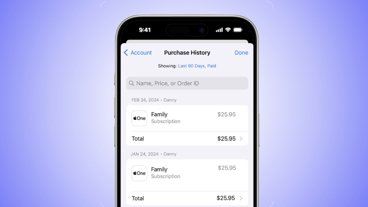Apple, rapper Eminem could end up in trial over iTunes battle
The lawsuit stems from 2007, when the rapper sued Apple over the sale of his songs in iTunes, alleging the tracks were sold without his blessing. Also included in the lawsuit is Aftermath Records, the company that controls Eminem's songs.
According to Reuters, the matter will head to trial this week if the parties involved are not able to reach a last-minute deal. Eminem and Eight Mile Style allege that Apple is providing downloads of the artist's song through iTunes without proper permission. Apple, along with Aftermath Records, contends that not only is their arrangement legal, but the publisher has received royalties for the sale of songs on the iTunes Music Store.
A conference with Judge Virginia Morgan is scheduled for Wednesday with the involved parties in Ann Arbor, Mich.
Under most contracts with their labels, artists receive around 20 cents — or less than 30 percent — of the approximate 70 cents Apple pays labels for the sale of each 99 cent song sold, under the assumption that such sales are part of a distribution deal. But Eminem's attorneys have argued that since digital sales differ from traditional record store sales. They say the music content has long been licensed with restrictions, and artists should see a 50-50 split, or about 35 cents a song, per their existing agreements.
When songs are sold on iTunes, the overhead usually required to promote and distribute is no longer the responsibility of the record label. Instead, that responsibility falls on Apple, which runs the iTunes Music Store. As such, Eminem and Eight Mile Style believe that the artists are entitled to a larger share of digital downloads, and less should go to the labels.
Eminem and Apple have had their share of disputes in the past. In 2004, the rapper sued the iPod maker after he alleged that Apple illegally used the song "Lose Yourself" in an advertisement without his permission. That suit was later settled out of court for an undisclosed sum.
 Slash Lane
Slash Lane













 Amber Neely
Amber Neely
 Thomas Sibilly
Thomas Sibilly
 AppleInsider Staff
AppleInsider Staff
 William Gallagher
William Gallagher
 Malcolm Owen
Malcolm Owen
 Christine McKee
Christine McKee










41 Comments
Looks like another out of court settlement. Next.
Looks like another out of court settlement. Next.
Naw Eminem going to release a rap diss record about Apple
Sam Kinison sums it up for me in his song Rap Sucks on his Live from Hell album.
Artists should get more and downloads should be cheaper than buying a physical CD, good luck Mr Mathers, I hope you can kick start a revolt against greedy studios!
Artists should get more and downloads should be cheaper than buying a physical CD, good luck Mr Mathers, I hope you can kick start a revolt against greedy studios!
if artists don't like their corporate masters then maybe they should pay for all the production costs of their albums themselves?
the last beyonce album had something like 5 videos but i noticed the same actors between them so i'm guessing they were all shot at the same time. Figure $30 million or so production costs for the videos and another $5 million for the album.
even madonna with all her cash still goes through a record company